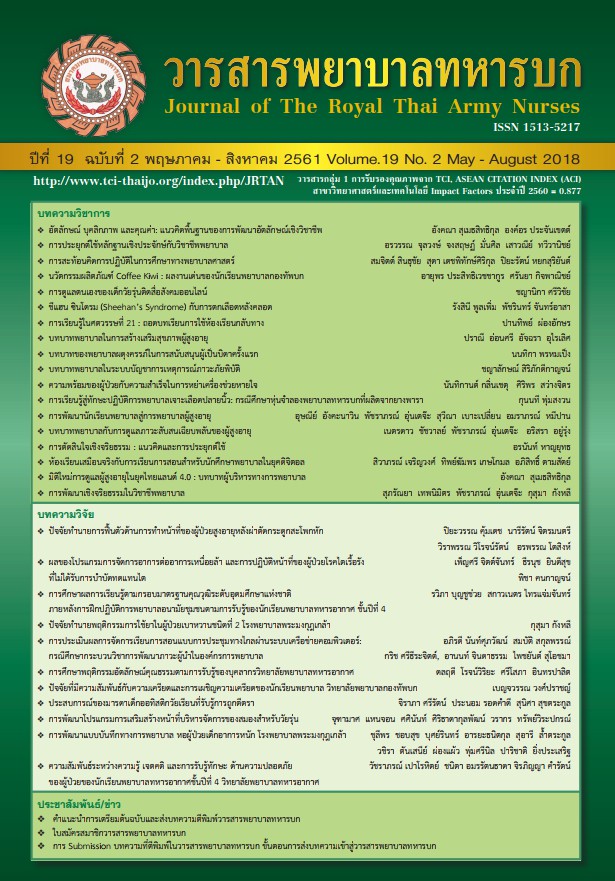Identity Personality and Values: The Foundation of Professional Identity Development
Keywords:
identity, personalit, valuesAbstract
This article aims to review the crucial components of identity development. In particular, recently graduated or pre-service nurses which have specific character traits in both the science and art caring for human health efficiently and effectively. Consequently, clients would have satisfaction in their healthcare service and a better quality of life. Therefore, studying the components of identity development is essential. The literature review found that educational administrators and others related should intend to learn about and understand the personality which describe the details of personal identity and developable and values of each learner which affect the decision and behaviors. As a result, they could plan, analyze and develop what are the desirable traits in order for each institution to develop each individual’s identity to its maximum potential.
Downloads
References
2. Nikbakht Nasrabadi A, Emami A. Perceptions of nursing practice in Iran. Nurs Outlook 2006; 54:320-27.
3. Ministry of public health. Thailand 20 Year Strategic Plan and Reforms (public heath aspect). Nonthaburi: The Ministry; 2016.
4. Hages JS, Kosier BE. Professional nursing practice: Concept and perspectives. 5 ed. USA: Julie Levin Alexander publish; 2006.
5. Dimitriadou A, Sapountzi-Krepia D, Psychogiou M, Konstantinidou-Straykou A, Peterson D, Benos A. The identity of the nursing staff in northern greece. Health Science Journal 2008;2(4): 206-218.
6. Serra MN. Learning to be a nurse. Professional identity in nursing students. Educ Sci J. 2008;5:65-76.
7. Burke PJ. Identity Change. Social Psychology Quarterly. 2006;69(1):81-96.
8. Farmer SM, Dyne LV. The idealized self and the situated self as predictors of employee work behaviors. Journal of Applied Psychology. 2010; 95(3): 503-516.
9. Fuengfusakul, A. Identity: theory and concept frameworks review. Bangkok: National Research Council of Thailand; 2003. (in Thai)
10. Adams GR, Marshall SK. 1996 A developmental social psychology of identity: Understanding the person-in-context. Journal of Adolescence. 1996;19(5):429-42.
11. Ashforth BE, Mael F. Social identity theory and the organization. Academy of Management Review. 1989; 14(1): 20–39. doi:10.5465/AMR.1989.4278999.
12. Olver JM, Mooradian TA. Personality traits and personal values: A conceptual and empirical integration. Personality and Individual Differences. 2003;35(1): 109–125. doi:10.1016/S0191-8869(02)00145-9.
13. Stevenson A, editors. Oxford English Dictionary. 3rd ed. Oxford: Oxford Univesity Press; 2010.
14. Feather, NT. Values, valences, expectations and actions. Journal of Social Issues. 1992; 48(2): 109-124.
15. Schwartz S, Bilsky W. Toward a theory of the universal content and structure of values: Extensions and cross-cultural replications. Journal of Personality and Social Psychology. 1990; 58(5):878-891.
16. Bernard M, Maio G, Olson J. The vulnerability of values to attack: Inoculation of values and value-relevant attitudes. Personality and Social Psychology Bulletin. 2003; 29:63-75.
17. Bardi A, Hofmann-Towfigh N, Lee JA, Soutar G. The structure of intra-individual value change. Journal of Personality and Social Psychology. 2009;97(5): 913-929.
18. Rodkamdee P, Lerwitworapong W, Chiwarak C. The professional image of nursing. Nonthaburi: Nursing council; 1997. (in Thai)
19. Bolan C, Grainger P. Students in the BN program – Do their perceptions change? Nurse Education Today. 2009; 29(7): 775–779. doi:10.1016/j. nedt.2009.03.016
20. Cook TH, Gilmer M, Bess CJ. Beginning students’ definitions of nursing: An inductive framework of professional identity. Journal of Nursing Education. 2003;42(7): 311-317.
21. Roccas S, Sagiv L, Schwartz SH, Knafo A. The big five personality factors and personal values. Personality and Social Psychology Bulletin. 2002; 28(6): 789–801. doi:10.1177/0146167202289008.
22. Sumetsittikul A, Meeparn A, Chaloeykitti S, Indhraratana A, Klinchet N. Model of nursing student identity development, the Royal Thai Army Nursing College. Bangkok: the institute; 2018.
23. Suwannachin C, Jantarapanya P. Student’s identity construction in higher education. Panyapiwat Journal. 2015;7(2): 267-280.
24. Rugsanor I, Chaiviboontham S, Pokpalagon P. Knowledge, attitude, and self efficacy in end-of-Life care of senior military student nurses. Journal of the Royal Thai Army Nurses. 2018, 19 (supplement) : 242-250. (in Thai)
Downloads
Published
How to Cite
Issue
Section
License
บทความหรือข้อคิดเห็นใดใดที่ปรากฏในวารสารพยาบาลทหารบกเป็นวรรณกรรมของผู้เขียน ซึ่งบรรณาธิการหรือสมาคมพยาบาลทหารบก ไม่จำเป็นต้องเห็นด้วย
บทความที่ได้รับการตีพิมพ์เป็นลิขสิทธิ์ของวารสารพยาบาลทหารบก
The ideas and opinions expressed in the Journal of The Royal Thai Army Nurses are those of the authors and not necessarily those
of the editor or Royal Thai Army Nurses Association.






